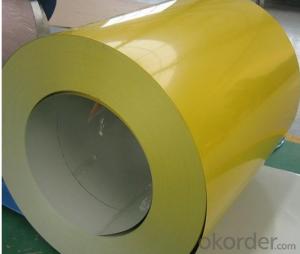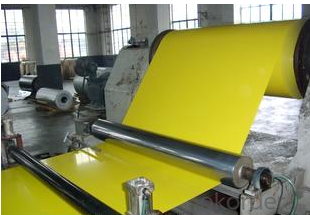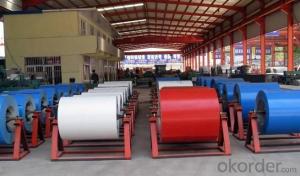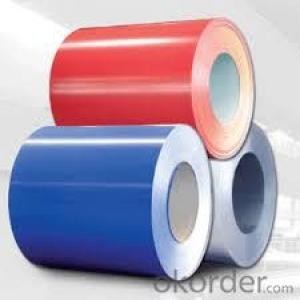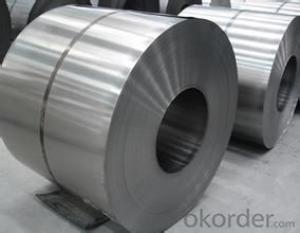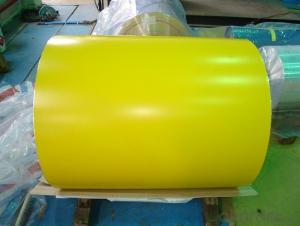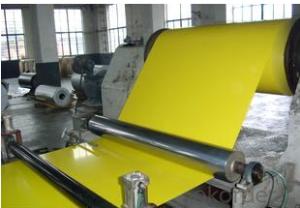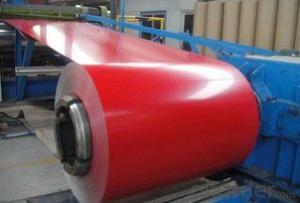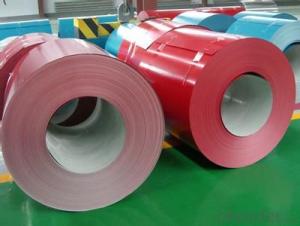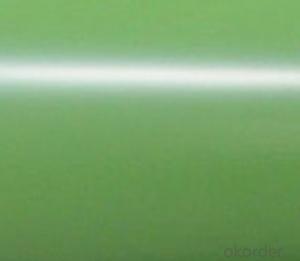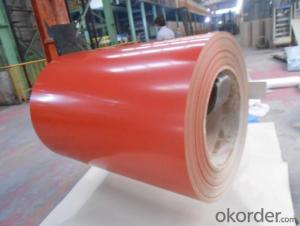Pre-Painted Galvanized Steel Sheet,Coil in Prime Quality Yellow Color
- Loading Port:
- Shanghai
- Payment Terms:
- TT OR LC
- Min Order Qty:
- 200 m.t.
- Supply Capability:
- 10000 m.t./month
OKorder Service Pledge
OKorder Financial Service
You Might Also Like
1. Pre-Painted Galvanized/Aluzinc Steel Coil Description:
With GI as base material, after pretreatment (degrease and chemical treatment ) and liquid dope with several layers of color, then after firing and cooling, finally the plate steel is called pre-painted galvanized (aluzinc) steel. Pre-painted galvanized steel is good capable of decoration, molding, corrosion resistance. It generally displays superior workability, durability and weather resistance.
2.Main Features of the Pre-Painted Galvanized/Aluzinc Steel Coil:
• Excellent process capability
• Smooth and flat surface
• Workability, durability
• Excellent heat resistance performance
• High strength
• Good formability
• Good visual effect
3.Pre-Painted Galvanized/Aluzinc Steel Coil Images
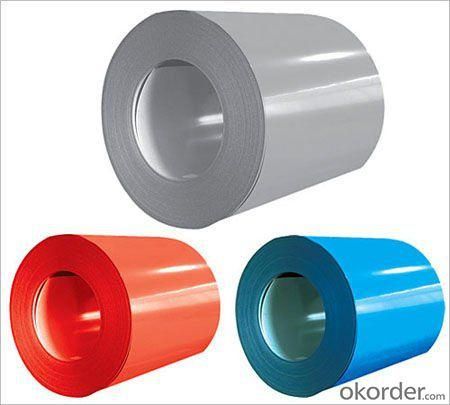
4.Pre-Painted Galvanized/Aluzinc Steel Coil Specification
Standard: AISI, ASTM, BS, DIN, GB, JIS
Grade: DX51D, DX52D
Thickness: 0.17-2.0mm
Brand Name: KMRLON
Model Number: coil
Type: Steel Coil
Technique: Cold Rolled
Surface Treatment: Coated
Application: Boiler Plate
Special Use: High-strength Steel Plate
Width: 20-1250mm
Length: customized
commoidty: pre-painted galvanized steel coil
Thickness: 0.13-4.0mm
width: 20-1250mm
zinc coating: 40-180g/m2
printing thickness: top side: 20+/-5 microns, back side: 5-7 microns
color: all RAL color
surface treatment: color coated
coil weight: 4-7 tons
coil ID: 508/610mm
packaging: standard seaworthy packing
5.FAQ of Pre-Painted Galvanized/Aluzinc Steel Coil
1. What’s the application of this product?
Roof, roof structure, surface sheet of balcony, frame of window, etc.
2. What’s the brand of the paint?
We use the best brand of all of the word—AKZO.
3. How about your company?
A world class manufacturer & supplier of castings forging in carbon steel and alloy steel,is one of the large-scale professional investment casting production bases in China,consisting of both casting foundry forging and machining factory. Annually more than 8000 tons Precision casting and forging parts are exported to markets in Europe,America and Japan. OEM casting and forging service available according to customer’s requirements.
4. How to guarantee the quality of the products?
We have established the international advanced quality management system,every link from raw material to final product we have strict quality test;We resolutely put an end to unqualified products flowing into the market. At the same time, we will provide necessary follow-up service assurance.
5. How long can we receive the product after purchase?
Usually within thirty working days after receiving buyer’s advance payment or LC. We will arrange the factory manufacturing as soon as possible. The cargo readiness usually takes 15-25 days, but the shipment will depend on the vessel situation.
- Q: I'm getting new strings on my dad's old acoustic guitar so I can learn how to play it and I'm wondering if I should get nylon or steel strings. Are there any major differences between the two aside from the nylon strings being easier on your fingers? Like do the Nylon strings sound different?
- Steel strings sound much better as in brightness and tone. Nylon strings sound dull and don't hold tune well but are easier to press. You need to build calouses on your finger tips and using steel will do this, just take it easy until they form and stop when they start hurting moderately. When you put new strings on a guitar, it's very good to break them in by pulling on them from the neck upwards to stretch them out. If you don't, you will need to tune them much until they wear themselves in. Good luck and make some sweet music !!
- Q: How are steel coils used in the production of automotive wheels?
- Steel coils are used in the production of automotive wheels as they are shaped and molded into rims before being welded or bolted onto the wheel hubs. The steel coils provide the necessary strength and durability required for the wheels to handle the weight and stresses of the vehicle, ensuring a safe and reliable driving experience.
- Q: What are the different types of steel coil surface appearances?
- The different types of steel coil surface appearances include hot rolled, cold rolled, galvanized, coated, and textured finishes.
- Q: explain what happen if carbon steel is exposed to an oxygen rich atmosphere at elevated temperature inside a furnace.
- Assuming the steel isn't actually melted, two things will happen. First, a layer of iron(ii) oxide, FeO will slowly develop on the surface, getting thicker over time. This layer is usually poorly bonded to the metal surface, it tends to flake off, exposing fresh metal. This is known as mill scale, it's also known as wustite which is the mineral term. Second, the surface of the steel will become decarburized, essentially becoming pure iron, not steel. The depth of the decarburized layer depends on the temperature, time, and the diffusivity of carbon in the steel at the given temp. This has some implications to engineering, in hot-rolling or forging of steel shapes for example. It's often the case that the stress and strain in a material is greatest at or near the surface. Therefore the weakened, decarburized layer at the surface may have a much greater detrimental effect on the steel's performance than might be expected. In a more specific example, die and tool steels depend on their carbon content for their strength and wear resistance, Therefore if such steels are heated in an oxidzing atmosphere, wear resistance is totally destroyed: The thin decarburized iron layer will be extremely soft and malleable.
- Q: I want to purchase steel for construction purpose, What aspects should I keep in mind while deciding that which company should I contact for this?
- I'd keep in mind whether your potential supplier is close enough to still give you good service, and provide delivery when you need it. I'd want to contact as many local companies as possible, in order to get competitive bids. Then, I'd pick the lowest cost bids that I felt would still provide the service I needed. Most decisions of this sort, in the end, are based on price.
- Q: How are steel coils used in the production of heating systems?
- Steel coils are used in the production of heating systems in various ways. One of the main uses of steel coils in heating systems is in the construction of heat exchangers. Heat exchangers play a crucial role in transferring heat from one medium to another within the heating system. The steel coils are typically formed into a series of tubes or fins, which provide a large surface area for efficient heat transfer. In a typical heating system, hot gases or liquids pass through these steel coils, while another medium, such as air or water, flows over or through the coils. This allows for the transfer of heat energy from the hot medium to the cooler medium, thereby effectively heating the air or water for distribution throughout the heating system. Another use of steel coils in heating systems is for the production of radiant heating panels or floor heating systems. In these applications, the steel coils are typically embedded within a panel or underneath the flooring. When electricity or hot water is passed through the coils, they heat up, radiating heat to the surrounding environment. This type of heating system is particularly efficient and provides a comfortable and even distribution of heat. Furthermore, steel coils are also used in the manufacturing of heating system components such as boilers, furnaces, and heat pumps. These components often require the use of steel coils for their heat transfer capabilities and durability. The coils are integrated into the design of these heating system units to ensure efficient and reliable heat generation and distribution. Overall, steel coils play a crucial role in the production of heating systems by enabling efficient heat transfer, providing durability, and facilitating the generation and distribution of heat.
- Q: How are steel coils protected from extreme weather conditions?
- Steel coils are protected from extreme weather conditions by being stored in covered warehouses or using waterproof covers to prevent direct exposure to rain, snow, and other elements. Additionally, corrosion-resistant coatings are often applied to the surface of the coils to provide an extra layer of protection against moisture and other environmental factors.
- Q: What are the different coil cutting machine options available for steel coils?
- There are several coil cutting machine options available for steel coils, including slitting machines, cut-to-length machines, and blanking machines. Slitting machines are used to cut the steel coils into narrower strips, while cut-to-length machines are designed to cut the coils into specific lengths. Blanking machines, on the other hand, are used to cut the steel coils into various shapes and sizes. These coil cutting machines offer different capabilities and can be chosen based on the specific requirements of the steel coil cutting process.
- Q: How do steel coil manufacturers minimize waste and maximize efficiency?
- Steel coil manufacturers minimize waste and maximize efficiency by implementing various strategies such as optimizing production processes, recycling and reusing scrap materials, adopting advanced technologies for energy conservation, and implementing lean manufacturing principles to eliminate unnecessary steps and reduce downtime. They also focus on continuous improvement, employee training, and regular maintenance of equipment to ensure smooth operations and minimize waste generation.
- Q: What are the different types of steel coil surface treatment methods?
- There are several different types of steel coil surface treatment methods that are commonly used in various industries. These methods are employed to enhance the appearance, durability, and performance of steel coils. Some of the common types of steel coil surface treatment methods include: 1. Hot-dip galvanizing: This process involves immersing the steel coil in a bath of molten zinc. The zinc coating provides excellent corrosion resistance and protects the steel from rusting. 2. Electro-galvanizing: In this method, a thin layer of zinc is electroplated onto the surface of the steel coil. It offers similar corrosion protection as hot-dip galvanizing but with a thinner coating. 3. Cold-rolled steel coil: This process involves passing the steel coil through a series of rollers at room temperature. It results in a smooth and polished surface finish, which is ideal for applications that require a high-quality appearance. 4. Pre-painted steel coil: Also known as color-coated steel coil, this treatment method involves applying a layer of paint or coating onto the steel surface. It provides an attractive appearance and additional protection against corrosion. 5. Phosphating: This treatment method involves applying a phosphate coating onto the steel surface. Phosphating improves the adhesion of subsequent coatings, such as paint or powder coating, and provides corrosion resistance. 6. Chromate conversion coating: This method involves applying a conversion coating, typically using chromium compounds, onto the steel coil surface. It enhances the paint adhesion and provides corrosion resistance. 7. Passivation: Passivation is a chemical treatment that is used to remove iron oxide and other contaminants from the steel surface. It improves the corrosion resistance of the steel coil. 8. Oiling: Oiling is a common surface treatment method that involves applying a thin layer of oil onto the steel coil surface. It helps to prevent corrosion during storage and transportation. These are some of the commonly used steel coil surface treatment methods. The choice of treatment method depends on the specific requirements of the application, such as corrosion resistance, appearance, and performance.
Send your message to us
Pre-Painted Galvanized Steel Sheet,Coil in Prime Quality Yellow Color
- Loading Port:
- Shanghai
- Payment Terms:
- TT OR LC
- Min Order Qty:
- 200 m.t.
- Supply Capability:
- 10000 m.t./month
OKorder Service Pledge
OKorder Financial Service
Similar products
Hot products
Hot Searches
Related keywords
